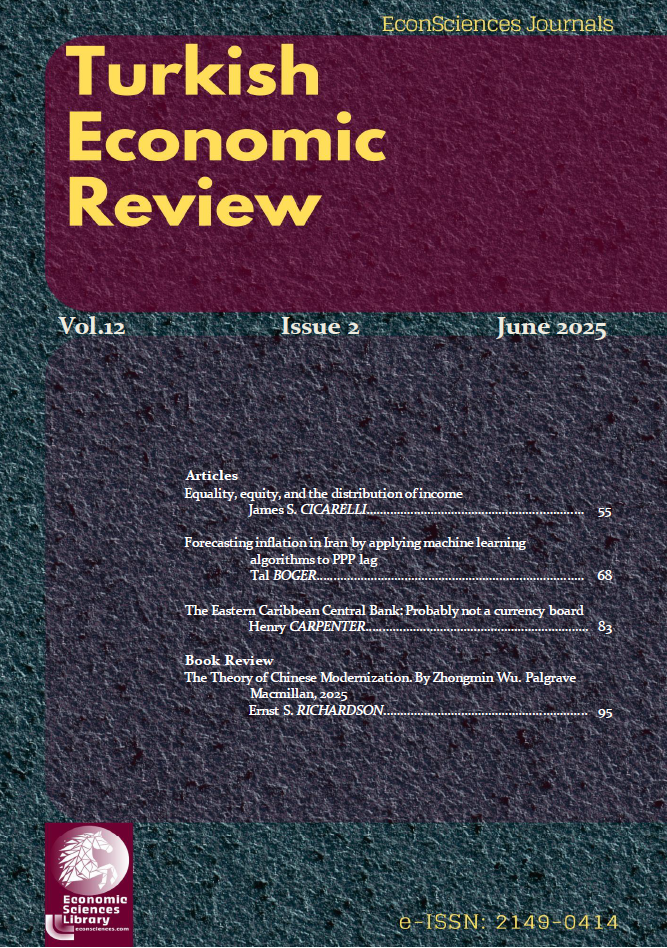Abstract
The International Monetary Fund classifies the Eastern Caribbean Central Bank – representing Antigua and Barbuda, Dominica, Grenada, Montserrat, St. Kitts and Nevis, St. Lucia, St. Vincent and the Grenadines, and Anguilla – as a currency board, but analysis of balance sheet data and monthly financial statements shows that that is probably not the case. The ECCB is at most an extremely unorthodox currency board, and it is now likely nothing more than a central bank, although, according to several statistical tests, until 2008 it behaved more like a currency board.
Keywords. Currency board; Eastern Caribbean Central Bank.
JEL. A10; E58; N16.
References
Board of Commissioners of Currency, British Caribbean Territories (Eastern Group). (1950). Constitution of Currency Board - British Caribbean Territories (Eastern Group).
Brown, D. R., Farrell, T. W., & Forde, P. (1989). History of money and banking in Trinidad and Tobago from 1789 to 1989. Central Bank of Trinidad and Tobago.
ECCA (East Caribbean Currency Authority). (1965). East Caribbean currency agreement 1965.
Eastern Caribbean Central Bank. (1983). Eastern Caribbean Central Bank agreement. Retrieved from [https://www.imdb.com/title/tt4205954/](https://www.imdb.com/title/tt4205954/).
Eastern Caribbean Central Bank. (n.d.a). Chronology of the Eastern Caribbean Central Bank. Retrieved April 16, 2016, from Eastern Caribbean Central Bank Web site.
Eastern Caribbean Central Bank. (n.d.b). Web site. Retrieved from http://www.eccb-centralbank.org/
Favaro, E. M. (2008). Small states, smart solutions: Improving connectivity and increasing the effectiveness of public services. World Bank. https://doi.org/10.1596/978-0-8213-7421-2
Hanke, S. H. (2002a). Currency boards. The ANNALS of the American Academy of Political and Social Science, 579(1), 87–105. https://doi.org/10.1177/0002716201579001006
Hanke, S. H. (2002b). On dollarization and currency boards: Error and deception. Journal of Policy Reform, 5(4), 203–222. https://doi.org/10.1080/1386415022000045618
Hanke, S. H. (2008). Friedman: Float or fix? Cato Journal, 28(2), 275–285. https://doi.org/10.36009/CJ.28.2.3
Hanke, S. H., & Schuler, K. (1995). Alternative monetary regimes for Jamaica. Private Sector Organisation of Jamaica. http://papers.ssrn.com/sol3/papers.cfm?abstract_id=2259219
International Monetary Fund. (2014). Annual report on exchange arrangements and exchange restrictions. https://doi.org/10.5089/9781498357738.002
International Monetary Fund. (n.d.). International financial statistics (monthly database). Retrieved from http://data.imf.org/
Krus, N., & Schuler, K. (2014). Currency board financial statements (Studies in Applied Economics Working Paper Series). Johns Hopkins Institute for Applied Economics, Global Health, and Study of Business Enterprise. http://krieger.jhu.edu/iae/economics/KrusSchuler_Currency_Board_Financial_Statements_2014.12.21.pdf
Van Beek, F. (2000). The financial system. In The Eastern Caribbean Currency Union: Institutions, performance, and policy issues. International Monetary Fund. https://doi.org/10.5089/9781557758752.007

This work is licensed under a Creative Commons Attribution-NonCommercial 4.0 International License.
